
A staff-level agreement on IMF assistance has been reached between the Lebanese government and the International Fund (Photo credit: Kristi Blokhin)
Want to get the Morning Brief by email? Click here to sign up.
The International Monetary Fund and the Lebanese negotiating team have reached a tentative agreement on an economic program. Known as a staff-level agreement, meaning that the staff of both parties have reached a deal, the program must still be reviewed and ratified by the IMF’s management and executive board. In a statement released by the IMF, the fund agreed to support Lebanon for up to 46 months with $3 billion, in exchange for the Lebanese Government agreeing to undertake massive critical reforms, which must be implemented before the IMF executive board can vote on the loan. The announcement came during a meeting between the IMF delegation and the president, prime minister and top ministers at Baabda Palace. Mikati briefly spoke to the press after the meeting, saying “We announce that we are fully committed to coordinating with the IMF in order to pull Lebanon out of its recession and put it on the path of recovery,” adding that “Reforms are in the interest of Lebanon, and we need them to be fully implemented.” Sources confirmed to L'Orient Today that the government has gamed out with the fund multiple scenarios for dealing with the distribution of financial losses. These alternatives will be reviewed by the IMF’s management before one is approved. Lebanon is in a dire economic situation, with its GDP decreasing by 25.9 percent year-on-year in 2020.Both Saudi Arabia and Kuwait announced yesterday the resumption of ties with Lebanon after an almost six-month hiatus. The two countries announced the return of their ambassadors to Beirut on Thursday night. Diplomatic ties between Lebanon and the Gulf Arab states became strained in October after previously recorded comments made by then-Information Minister George Kurdahi critical of the kingdom’s intervention in Yemen aired on television. Other Gulf monarchies, including the United Arab Emirates, Bahrain, and Kuwait, followed Saudi Arabia’s lead and pulled their ambassadors from Lebanon. Yesterday’s tweet by the Saudi Foreign Affairs Ministry did not state whether the trade ban imposed on Lebanese exports would be lifted. Attempts to mend ties between the two countries were spearheaded first by French President Emmanuel Macron and by Kuwait through the so-called Kuwaiti initiative, in which a 12-point roadmap of demands from the Gulf states was presented to Lebanon in January.
President Michael Aoun yesterday received the head of the European Union Election Observation Mission, Gyorgy Holvenyi. During the meeting, Holvenyi assured Aoun that his mission would draw up recommendations for future elections. He added that “This mission is proof of the EU’s commitment to peace and democracy in Lebanon.” EU election observers, who are present at the request of the Lebanese government, started arriving in Lebanon on March 27 and will remain until June 6. In addition to monitoring the elections, the mission will publish a post-election report with recommendations. Aoun thanked Holvenyi, and added that electoral megacenters would have raised voter turnout. Megacenters would allow voters to cast their ballot near where they live, instead of having to travel back to their towns of origin, where they are registered to vote. In early March, the cabinet dropped a proposal to create voting megacenters ahead of the May elections, and pushed for them to be implemented for the next election cycle in 2026. Championed by Aoun and Free Patriotic Movement leader Gebran Bassil, the initiative sparked backlash from political opponents, who alleged that it was a pretext for postponing the elections. On Wednesday, Prime Minsiter Najib Mikati assured the public that any obstacles impeding the May 15 elections from going ahead would be prevented.
A Baabda court rejected Indictment Chamber Judge Pierre Francis’ request to recuse himself from ruling on the release of Raja Salameh. Salameh is the brother of central bank Governor Riad Salameh. The reasons for Francis’ recusal request on Tuesday are still unknown, however sources said that the judge is close to President Michael Aoun. Judge Nicolas Mansour had ordered the release of Raja Salameh on 500 billion lira bail, but Judge Ghada Aoun appealed the decision last Friday. This appeal was then sent to the Indictment Chamber, over which Francis presides. Since his recusal request meant that a ruling could not be issued, Salameh remains in custody. Judge Aoun had Salameh arrested after he was questioned in connection to illicit enrichment allegations related to Forry Associates, a British Virgin Islands-registered company he runs. He has been in detention since March 17. In late March, five European countries, France, Germany, Luxembourg, Monaco and Belgium, froze €120 million in assets that German prosecutors confirmed were tied to the Salameh investigation.
Tomorrow is the official signing ceremony is to be held for the establishment of American University of Beirut - Mediterraneo, AUB’s new campus in Cyprus. It will take place at Paphos’ Markidio Municipal Theater at 7:15 pm, and will be attended by the Cypriot President Nicos Anastasiades, US Assistant Secretary of State for Educational and Cultural Affairs, Lee Satterfield, AUB President Fadlo Khuri and the US Ambassador to Cyprus, Judith Garber. Renderings and the campus’ architectural designs will be unveiled during the ceremony. Yesterday, the state department released a statement saying “Assistant Secretary Satterfield will participate in a historic ceremony with leadership from the Republic of Cyprus and the American University of Beirut (AUB) to celebrate AUB’s decision to open its first campus outside Lebanon.” Cypriot Education Minister Prodromos Prodromou met with Satterfield and said the establishment of the campus will deepen ties between the United States and Cyprus.
In case you missed it, here’s our must-read story from yesterday: #4 As the legislative elections approach, is the Lebanese left divided?